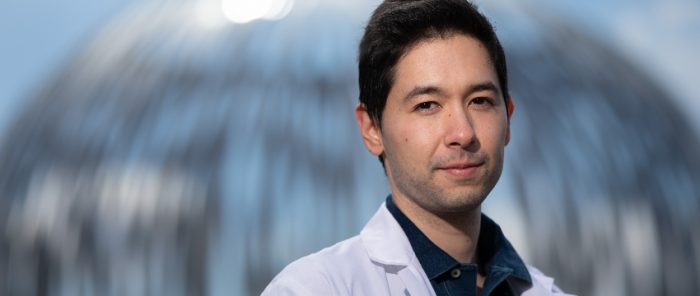
Source: McGill University Advancement
Matthew Cheng, MDCM’11
Assistant Professor, Faculty of Medicine
Clinician-scientist at the McGill University Health Centre
I applied to Medicine out of CEGEP. I knew that I wanted to stay within Quebec. I wanted to go the pre-med route. And I chose to study Medicine at McGill because I thought it was the best program for me.
It was awesome. I loved it. I had a particularly good time during the last two years when I was “let loose on the wards” as a clerk. I learned a ton. The training environment was fantastic. I had really great mentors throughout the entire process.
“COVID is the best of times and it’s the worst of times. We’re working extraordinary hours per week. It’s physically draining, emotionally difficult, but extraordinarily rewarding. I’ve never been a part of an experience like that where you’re able to impact the lives of so many people.”
I did an internal medicine residency in Vancouver. I came back to do a sub-speciality in infectious diseases and medical microbiology at McGill. After that I went to Harvard where I trained in transplant infectious diseases and learned about clinical trials and translational research.
I don’t think there is a more fascinating field in all of medicine than infectious diseases. And we’re living it right now. There’s no other field that, every year, you are faced with a new challenge or you’re forced to learn on the go. The field is rapidly advancing, and you have the opportunity to impact not only your patients, but the lives of millions of people across the world through clinical research.
COVID is the best of times and it’s the worst of times. We’re working extraordinary hours per week. It’s physically draining, emotionally difficult, but extraordinarily rewarding. I’ve never been a part of an experience like that where you’re able to impact the lives of so many people. The ability to offer clinical trials and possible treatments to patients who otherwise would not be treated is a privilege.
I’m leading two COVID-19 research projects funded by MI4 – the McGill Interdisciplinary Initiative in Infection and Immunity – and co-leading two others.
The first project is an in-patient clinical trial that I am leading with Dr. Todd Lee. It is called CATCO, which is the Canadian branch of the WHO-sponsored mega trial “Solidarity”. Currently in Canada there are four arms of the trial – at the MUHC we have two. We’re randomizing people for the standard of care or a drug called kaletra, but very soon we’ll also have remdesivir and hydroxychloroquine.
We’re offering patients the opportunity to participate and receive an experimental treatment for COVID. We have some preliminary idea that it would work, but these have not been robustly tested in clinical trials, which is the reason for doing the studies.
Paired with this clinical trial is a second study that I am leading, along with Drs. Erwin Schurr and Guillaume Bourque, where we’re sampling patients at specific time points to understand better why some people will respond to the treatment and some won’t. We’re really trying to be able to identify those most likely to derive benefit from the drug without exposing people unnecessarily to side effects.
“I’m really proud that MI4 is helping lead the charge by empowering its investigators and doing everything it can to put us in a position to succeed and to contribute.”
The third project that I am co-leading with Drs. Todd Lee and Emily McDonald is an out-patient trial that just finished. The purpose of this study was all about preserving healthcare resources and the results were just published in the New England Journal of Medicine. We conducted a double-blind, randomized, placebo-controlled international study. The results showed that hydroxychloroquine is not effective in preventing COVID-19 in people who were exposed to SARS-CoV-2.
The last project I am co-leading is a project that is directly in relation to my job at the Canadian COVID-19 Immunity Task Force, a massive endeavour announced by the prime minister in April 2020. I was appointed scientific program manager for diagnostics and will be working closely with my MUHC infectious disease colleagues Drs. Cédric Yansouni and Jesse Papenburg. We have this opportunity to understand the immune response to COVID-19, but also the way the virus is transmitted in our communities. To find out how many people have been infected and who is protected from future infection. We will determine how many people remain susceptible, and our results are going to inform future public health policy.
We have never seen the medical and scientific communities band together to face such a problem before. I’m really proud that MI4 is helping lead the charge by empowering its investigators and doing everything it can to put us in a position to succeed and to contribute.
July 15 2020
